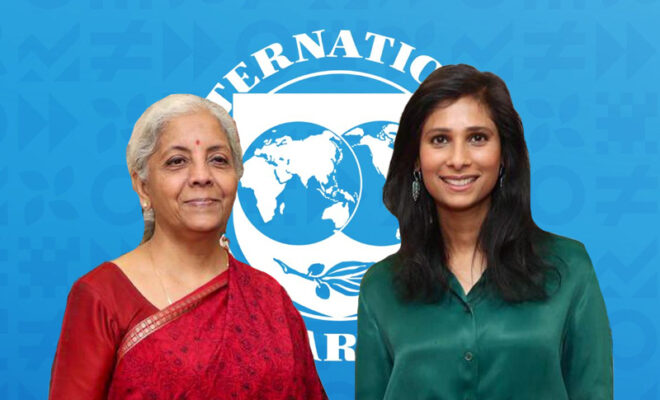IMF-WB Meeting: FM Sitharaman Discuss With Gita Gopinath

FM Sitharaman and IMF Deputy Managing Director Gita Gopinath have discussed the various issues related to the Indian & global economy amidst the COVID pandemic.
The Union Finance Minister Nirmala Sitharaman met with Gita Gopinath, the First Deputy Managing Director of the International Monetary Fund (IMF), on Tuesday to address debt risks and other matters.
FM Sitharaman is heading a powerful Indian delegation to the annual spring conference of the IMF and World Bank.
The IMF-WB #SpringMeetings 2023 are currently taking place in Washington, DC, and the Union Finance Minister, Smt. @nsitharaman, met with Ms. @GitaGopinath, FDMD, International Monetary Fund @IMFNews, on the margins of the meetings.
She commended Gopinath for advancing India’s work on the Global Sovereign Debt Roundtable in conjunction with the World Bank and reaffirmed India’s commitment to support initiatives to address growing debt vulnerabilities, the finance ministry said in a tweet following the meeting.
Sitharaman raised during the meeting the key economic downside risks identified by the IMF in its World Economic Outlook report, including financial sector stress, rising real interest rates, high debt, inflation, geopolitical fragmentation, and slowing Chinese growth.
Gopinath also commended the finance minister for holding constructive conversations that resulted in a consensus set of fundamental principles and an action plan on crypto assets, according to the ministry. The consensus was reached in February on the necessity for a globally unified policy response on crypto assets.
Sitharaman welcomed the IMF’s assistance in creating evidence-based policy guidelines for the G20 presidency of India.
She previously spoke with Mohammed Aljadaan, her Saudi Arabian counterpart, about the global debt crisis and the need to strengthen multilateral development banks.
The finance ministry reported that in addition to the urgent need to address growing global debt distress and enhance Common Framework implementation, they also discussed global inflation challenges, including spillover effects of strategies taken on the growth potential of developing and low-income countries.



